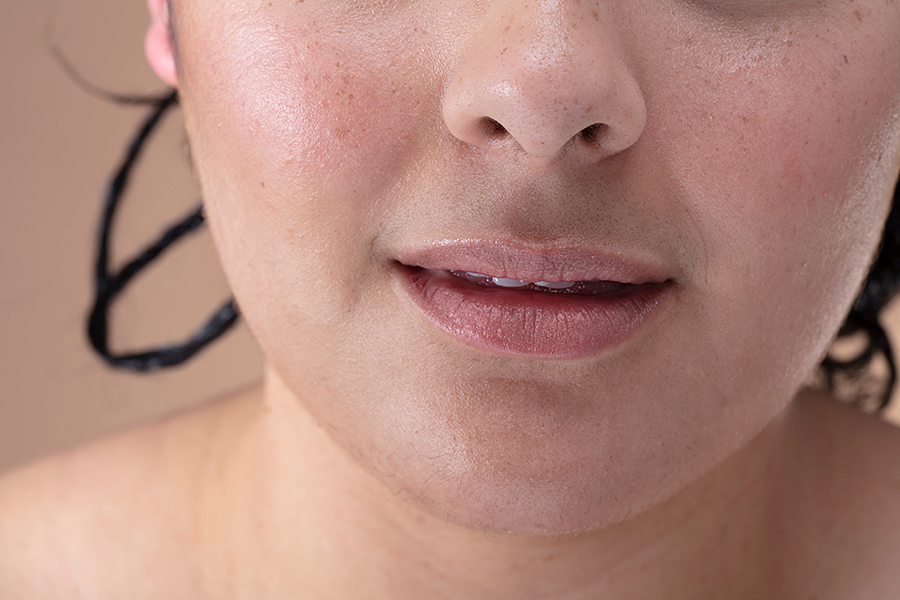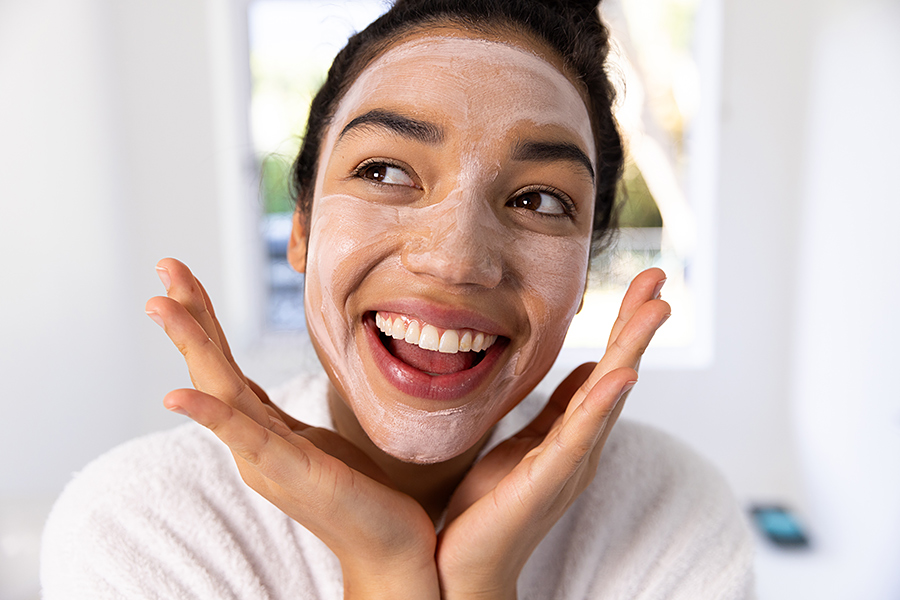Morning facial swelling is a common concern. It affects not only people with medical conditions but also many otherwise healthy individuals. Women experience facial puffiness more often, largely due to hormonal fluctuations, the menstrual cycle, and pregnancy.
In this article, we explain how swelling develops, why fluid builds up in the tissues, which factors most often trigger it, and when facial puffiness can be managed on your own versus when it’s a sign that you should see a doctor.
What Edema is and Why it Occurs
Every cell in the body exists in a fluid environment. This fluid delivers oxygen and nutrients while carrying away metabolic waste. The circulatory system is responsible for keeping this exchange efficient and balanced.
Blood flows from the heart through arteries, which gradually narrow and branch into capillaries. Their walls are extremely thin, allowing fluid and nutrients to pass into the space between cells. This is where cells receive what they need to function normally.
How Fluid Moves in and Out of Tissues
Fluid is not meant to stay in the tissues indefinitely. The lymphatic system is responsible for removing excess fluid and metabolic byproducts and returning them to the bloodstream through the venous system.
Under healthy conditions, this process remains balanced. The amount of fluid leaving the capillaries is matched by the amount removed through lymphatic drainage. As a result, the space between cells contains only as much fluid as is necessary for normal cellular activity.
When Swelling Develops
Edema occurs when this balance is disrupted. This may happen if blood vessels allow more fluid to escape than usual, if the lymphatic system does not drain fluid efficiently, or if substances such as salt or glucose accumulate in the tissues and attract water.
When excess fluid remains in the tissues, visible changes appear. The skin looks puffy, its texture may feel denser, and facial contours can become less defined.
One Mechanism Behind Different Causes
The mechanism behind edema is always the same. Whether swelling is triggered by poor sleep, hormonal changes, or an underlying medical condition, it begins with a disruption of normal fluid balance within the tissues.
Reasons for a Swollen Face

Allergy
Symptoms — sudden onset of facial swelling, as well as rapid local edema (for example, swelling around the eyes or lips). Such symptoms should be a matter of concern as they can be serious allergic reactions to the body (Quincke's edema). In this case, you should immediately seek medical help.
Problems with the Thyroid Gland
Symptoms — chronic puffiness of the arms, legs, and face. The swelling is palpable. Additional symptoms: pale skin, fatigue, poor physical condition. All these signs indicate a malfunction of the thyroid gland (hypothyroidism). It is also necessary to see a physician and receive treatment for the basic disease.
Kidneys or Adrenal Glands
Symptoms — a chronic form of severe face swelling as well as soft and swollen arms and legs. Damage to the glomeruli results in the escape of protein and sodium retention. Thus, water accumulates in the tissues, and it leads to the formation of edema. Changes in the function of the adrenal gland (for example, due to the treatment of any diseases with glucocorticosteroid hormones) also cause sodium retention and edema formation in the body.
Excess Body Fat
Adipose tissue actively retains fluid. The greater its volume, the higher the tendency toward swelling. Weight gain is often accompanied by facial fullness and noticeable leg swelling by the end of the day. This type of edema is directly related to the amount of body fat, and reducing it usually requires gradual, sustained weight loss.
High Blood Pressure
With long standing high blood pressure, blood vessels remain under constant strain. Venous return slows, pressure inside the capillaries increases, and fluid begins to move into surrounding tissues. This process leads to the development of edema.
A single blood pressure reading is not enough to confirm hypertension, as values fluctuate throughout the day. Clinicians typically recommend tracking blood pressure several times daily over multiple days. This approach helps distinguish temporary spikes from a persistent condition.
Disrupted Sleep Patterns
Poor sleep habits can worsen fluid retention. During healthy sleep, the body releases hormones that regulate fluid balance. When sleep is too short, fragmented, or irregular, this regulation becomes impaired, making swelling more frequent and persistent.
Hormonal Fluid Retention
Facial swelling is often linked to hormonal changes. During certain phases of the menstrual cycle, especially in the days before a period, progesterone levels rise. This hormone promotes water retention, which can lead to noticeable puffiness of the face as well as swelling in the hands, legs, and breasts. Body weight may temporarily increase by about 1 to 3 kg (2 to 6 lb), and this change reflects fluid retention rather than an increase in body fat.
Pregnancy Related Changes
A similar mechanism occurs during pregnancy. Hormonal shifts encourage the body to retain more fluid as part of its normal physiological adaptation. As a result, swelling may appear in the face and other areas. In most cases, this type of edema is temporary and resolves on its own as hormone levels change.

Poor Pillow or Mattress Support
During sleep, the neck should stay in a neutral position without being sharply bent forward or tilted backward. A pillow that is too high or too low shifts the neck out of alignment, compressing veins and lymphatic vessels. When this happens, fluid drains from the face less effectively.
Over the course of the night, fluid accumulates in the soft tissues. By morning, this often shows up as under eye puffiness or fullness in the cheeks.
Swelling is usually more noticeable in people who sleep on their stomach. In this position, the face is pressed into the pillow, tissues remain under constant pressure, and fluid drainage slows down. Even people who are not prone to fluid retention may notice facial puffiness in the morning for this reason.
Neck Tension
Prolonged neck strain can interfere with normal fluid drainage from the face. This often happens with long hours at a computer, when the head is pushed forward and the neck stays in an unnatural position. Blood flows away from the head more slowly, pressure in the vessels increases, and fluid begins to accumulate in the surrounding tissues. The result is facial puffiness.
Swelling can also be linked to chronic tension in a key neck muscle that runs from the area behind the ear down to the collarbone. When this muscle stays tight, which is common with poor posture or shallow, chest based breathing, lymphatic flow slows down. Fluid then tends to collect under the chin and in the lower part of the face.
Typical signs include a forward head posture, limited neck mobility, and tenderness when pressing on the side of the neck.
Any Alcohol Containing Drinks
After a glass of wine or an evening out, facial puffiness the next morning is very common. Alcohol acts as a toxin in the bloodstream. To reduce its concentration, the body retains fluid.
At the same time, the kidneys increase urine output, leading to water loss, while sodium is more likely to stay in the body. This imbalance causes fluid to shift into the tissues. By morning, the face may look swollen or puffy.
Alcohol also has a delayed effect. Its breakdown products remain in the bloodstream for hours and continue to irritate blood vessels. The vessel walls become more permeable, allowing fluid to leak into the surrounding tissues. Because of this, swelling may persist not only the next morning but for several days afterward.
Medications and Dietary Supplements
Facial swelling can occur in people who take certain medications or supplements on a regular basis. This is usually related to how these substances affect blood vessels, hormone balance, or kidney function.
Some blood pressure medications can promote fluid retention by altering how fluid moves through the vessels. Hormonal contraceptives may also cause temporary puffiness due to their influence on hormones that regulate water balance. Certain dietary supplements, including protein based products, can lead to short term fluid retention as the body adjusts its metabolism. Medications used to manage diabetes may also increase the tendency to retain water.
If facial swelling appears soon after starting a new medication or supplement, it is important to discuss this with a healthcare provider. Do not stop taking prescribed medications on your own. A clinician can help adjust the dose or suggest an alternative if needed.
Facial Swelling Related to Skincare and Procedures
Facial puffiness can result from skincare products or cosmetic treatments rather than medical conditions. Heavy creams applied late in the evening may trap moisture and lead to morning swelling, especially around the eyes.
Active ingredients and sensitive skin can make blood vessels more reactive, allowing fluid to move into the tissues. This is more common in people with a weakened skin barrier or conditions such as rosacea.
Temporary swelling is also common after cosmetic procedures. Treatments that irritate the skin or involve injections can disrupt normal fluid drainage. In most cases, this swelling fades on its own as the skin recovers.
How to Treat Swelling

Whatever the cause of chronic edema, you should first consult a specialist in order to find the reason for swelling and the method of treatment. Still, there are some simple tips.
Healthy Sleep Schedule
You should get 6-8 hours of sleep each night. It is recommended to go to bed no later than 11 pm. Despite the banality of this advice, the regime is of fundamental importance as hormonal activity changes within a day. Irregular sleep habits lead to a hormonal imbalance, which is reflected in the form of facial swelling.
Daily Water Intake
The main amount of water should be consumed before 6-7 pm. Try not to eat salty, smoked, or fried food before going to sleep. It would be good to give up alcohol and smoking (it greatly affects the drainage functions of the face vessels) and increase physical activity.
Self-Massage
You should include creams and serums with peptides and other ingredients (caffeine, chestnut, licorice, algae extracts) in your daily care, especially before bed. They might help to reduce facial swelling.
When to See a Doctor
In most cases, mild morning facial swelling is not a sign of a serious condition and improves with lifestyle changes. However, medical evaluation is important if swelling behaves differently.
You should consult a healthcare provider if facial swelling:
- appears suddenly and is pronounced
- does not decrease during the day or gradually worsens
- is accompanied by pain, fever, shortness of breath, or difficulty breathing
- is persistent and occurs regularly without an obvious trigger
Chronic or unexplained swelling may be related to blood pressure issues, hormonal imbalance, kidney function, or other underlying conditions. Identifying the cause early allows for proper treatment and helps prevent complications.
